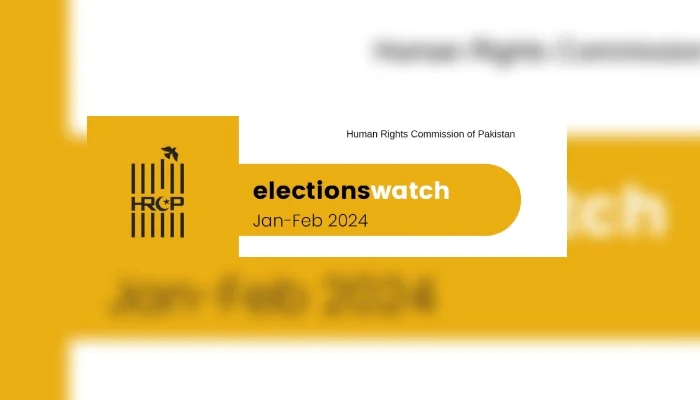LAHORE: The Human Rights Commission of Pakistan (HRCP) has raised concerns about the reliability and trustworthiness of the general elections held on February 8, especially the post-polling process, reported The News on Sunday.
According to observations made by HRCP’s election monitors, who conducted on-site inspections in 51 constituencies, the nationwide suspension of internet and mobile services on the day of the polls, along with unplanned alterations in polling information, jeopardised voters’ ability to locate polling stations.
The HRCP in its report released on Saturday said, this situation particularly affected women facing mobility constraints, individuals with disabilities, senior citizens, and voters with limited financial means.
Of particular concern is the protracted delay in the announcement of election results by the returning officers. Broadly speaking, the polling process itself remained transparent and peaceful. Polling staff were generally well-prepared and well-equipped. In almost all cases, polling agents and candidates were shown the empty ballot boxes before polling, and the presiding officer was observed stamping and signing the back of each ballot paper before giving it to the voter. The ballot box was in everyone’s sight at all times, and voters were allowed to stamp their ballot papers in secret.
However, the post-polling process was unsatisfactory. In a fifth of all polling stations observed by the HRCP, the presiding officer did not affix the statement of the count in a conspicuous place for public display or was not seen transmitting a photograph of the result to the returning officer and the ECP. It was alleged in many instances that the returning officer’s announcement did not tally with the presiding officer’s count.
Worryingly, reports of candidates, polling agents, and observers being denied permission to witness the provisional consolidation of results also surfaced. The HRCP recommends an independent audit of the 2024 elections under the supervision of a parliamentary body. Security and intelligence agencies should play no role in managing the electoral process or its outcomes. Parliament must also debate the utility of the caretaker government scheme. Seamless cellular and internet services must be available on polling day, including after polling has stopped.
The ECP must publish all Forms 45, 46, 48, and 49 under the Elections Act 2017. On receiving petitions from aggrieved political parties or candidates, the ECP should order ballot recounts in close contests, especially in cases where the number of rejected ballots exceeds the margin of victory.
The integrity of the 2024 elections was compromised, not only by a lack of competence on the part of the ECP but also by constant pressure from extra-democratic quarters and questionable decisions by the caretaker government, all of which the HRCP has documented in the year preceding the polls.
It is now critical for all parties to collectively uphold and protect civilian supremacy through consistent, meaningful, and inclusive political dialogue. Indeed, the biggest casualties of these elections have not been any one individual or political party per se, but democratic values, the rule of law, and the aspirations of ordinary people.



Comments are closed.